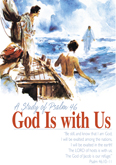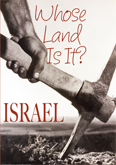×


We have detected your country as:
Please click here to go to the USA website or select another country from the dropdown list.

{image_1}
The Word of God is full of the idea of blessing. God blesses His people, people bless God, fathers bless their sons, God blesses things, and individuals bless others. Obviously, God the Creator knew what mental health professionals tell us today. One of the most basic needs of human beings is the need for affirmation or blessing.
Continue Reading »
{image_1}
What do you think of when you hear the word “Jerusalem”? Perhaps you think of the Mount of Olives splitting in two, when Messiah Yeshua (Christ Jesus) returns. “And in that day His feet will stand on the Mount of Olives, which faces Jerusalem on the east. And the Mount of Olives shall be split in two, from east to west, making a very large valley; half of the mountain shall move toward the north and half of it toward the south” (Zechariah 14:4). Perhaps you think of wars––past and future. Maybe you think of the prophecy in Zechariah (12:3), which says all nations will come up against Jerusalem. “And it shall happen in that day that I will make Jerusalem a very heavy stone for all peoples; all who would heave it away will surely be cut in pieces, though all nations of the earth are gathered against it.”
Continue Reading »
{image_1}
Last month, we began our look at Israel’s annual celebrations, some biblical, some traditional, and some secular. We started with Purim (Feast of Esther), which usually takes place in March, and ended with Shavuot (Pentecost). In this Teaching Letter, we will complete the year’s cycle of remembrances.
Continue Reading »
{image_1}
As Bible-believing Christians living in Israel, my husband Tom and I have come to see Israel from a unique perspective. It is an amazing place, called in Scripture “the glory of all lands” (Ezek. 20:6, 15). An immense variety of plants and animal species are native to the Land. The cultural diversity of Jewish people from over 100 nations is charming and maddening in turn. An eclectic mix of ancient and modern assault the senses. Israel is my home and I love it dearly. Certainly life in Israel is never boring. But, if I were to pick the most wonderful experience to us, it would be the celebrations.
Continue Reading »
{image_1}
He who dwells in the secret place of the Most High
shall abide under the shadow of the Almighty.”
Psalm 91:1

{image_1} A storm is coming. Any political analyst will tell you so. In fact, anyone who follows the news even occasionally would agree. It is no doubt a storm, the proportions of which, most of us underestimate. “Behold evil is going forth from nation to nation, and a great storm is being stirred up from the remotest parts of the earth. Those slain by the LORD on that day will be from one end of the earth to the other” (Jer. 25:32–33a, NASB).
Continue Reading »
{image_1} On the slopes of Table Mountain in Cape Town, South Africa stands a magnificent building, the Mount Nelson Hotel, a testimony to South Africa’s bygone era as a British colony. As a child, I remember my awe as I entered the expansive, gloomy foyer where people spoke in hushed voices and glided about noiselessly on thick pile carpets. The focal point in the foyer was a well-lit display cabinet, advertising South Africa’s finest diamond jewelry. The combination of the gloom, the location of the cabinet, and its valuable contents captured almost everyone’s attention. In a sense, it was the “Israel” of the hotel foyer!
Continue Reading »
{image_1} This has been the heartfelt cry of countless thousands of Jewish people over the centuries. It is recited daily in prayer, spoken out with longing and rejoicing, cried out in adversity, often hidden deep within hearts, and even thought of as an answer to dreams. What or whom has made this statement a reality for so many Jewish people from the time of Abraham to David––when Jerusalem was acknowledged as the capital of Israel in 1000 BC––right up to the past 100 years?
Continue Reading »
{image_1}
In the seventeen years I have lived in Israel, I have been blessed to learn many things which have given me fresh insight on the Scriptures. Some say that my husband and I, and the staff of Bridges for Peace, have given our lives to the Lord’s call to Israel. That is true, but what is also true is that Israel has given us new life as well. Christians who visit Israel invariably remark about how their Bible reading has come to life after a trip to Israel. In this Israel Teaching Letter, I want to share a few things that I have learned.
Continue Reading »
Through the centuries, the Jewish people have endured persecution, danger, and death. They have experienced unparalleled pain as a nation throughout the long years of their dispersion. Hundreds of years of persecution culminated in the Holocaust as Hitler and the Nazis systematically attempted to annihilate the Jewish people. Six million Jews were murdered.
Continue Reading »All logos and trademarks in this site are property of their respective owner. All other materials are property of Bridges for Peace. Copyright © 2025.
Website Site Design by J-Town Internet Services Ltd. - Based in Jerusalem and Serving the World.